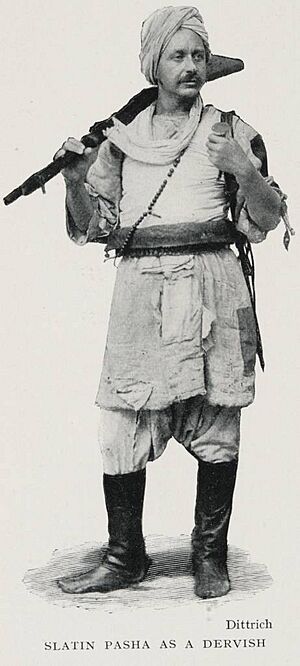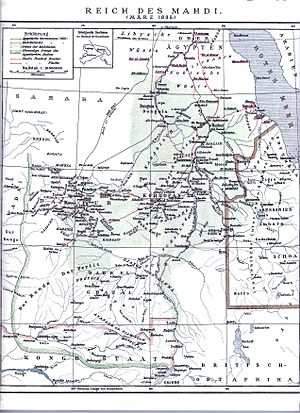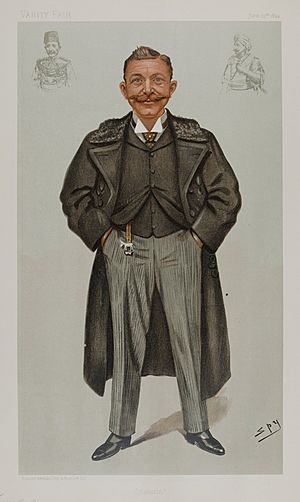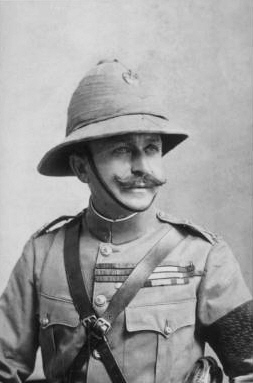Rudolf Carl von Slatin facts for kids
Rudolf Anton Carl von Slatin (born June 7, 1857, in Vienna, Austria – died October 4, 1932, in Vienna) was a famous soldier and leader. He was from both Austria and Britain and spent a lot of his life working in Sudan, a country in Africa. He became known for his adventures, especially after being held captive for many years.
Contents
Rudolf Slatin's Early Life
Rudolf Carl Slatin was born in a place called Ober Sankt Veit, near Vienna. He was the fourth child in his family. His father, Michael Slatin, was a merchant. Rudolf went to a business school in Vienna. While he was there, he heard about a job opening in Cairo, Egypt, for a bookseller's assistant.
Rudolf decided to travel to Egypt. He worked in the bookstore for a while. Later, he traveled with a German businessman to Khartoum, which is the capital of Sudan.
Exploring Sudan
From Khartoum, Rudolf Slatin explored different parts of Sudan, including the Nuba Mountains. He traveled with a German explorer who studied birds, Theodor von Heuglin. However, he had to return to Khartoum because local people were rebelling against the Egyptian government.
In Khartoum, Slatin met Dr. Schnitzer, who later became famous as "Emin Pasha." Slatin wanted to meet General Charles George Gordon, who was the Governor of the Equatorial Provinces at the time. But Slatin had to go back to Austria. Emin Pasha did meet Gordon and told him about young Slatin, suggesting Gordon hire him in Sudan.
Joining the Army
Slatin left Africa to join the Austrian army. He became a soldier in 1876 and was promoted to lieutenant a year later. In 1878, while serving in the army, he received a letter from General Gordon. Gordon invited him to come back to Sudan, where Gordon was now the Governor-General.
Slatin got permission to go to Africa. He arrived in Khartoum in January 1879. After a short time working as a financial inspector, Slatin was made the governor of Dara, a region in Darfur. He held this job until 1881. Then, he was promoted to Governor-General of Darfur and given the title of Bey.
Facing Challenges in Darfur
While he was governor of Dara, Slatin successfully fought against one of the local princes who was rebelling. Later, as governor of Darfur, he faced more challenges. In 1882, a group called the Rizeigat tribesmen rebelled. They were led by Sheikh Madibbo ibn Ali, who followed a religious leader known as the Mahdi.
Slatin bravely defended his province. Even though he won many battles, he slowly lost ground. In one battle, he lost many of his men and was wounded three times. He managed to fight his way back to Dara. Slatin believed his soldiers thought they were losing because he was a Christian. So, in 1883, he publicly became a Muslim and took the name Abd al Qadir.
Capture and Imprisonment
The Mahdists then captured el Obeid, a major city, which cut off all of Slatin's connections to Khartoum. When another British expedition was defeated in 1883, Slatin decided to surrender to the Mahdist leader, Emir Madibbo. He did not want to sacrifice any more lives in a hopeless fight.
When the Mahdists reached Khartoum, they tried to use Slatin to make General Charles George Gordon surrender. This did not work. Slatin was put in chains. On January 26, 1885, after Khartoum fell, Gordon's head was brought to the camp and shown to Slatin. After the Mahdi died that same year, Slatin was kept captive by the Mahdi's successor, Khalifa Abdullahi. He was sometimes treated very cruelly and sometimes with more kindness. During his captivity, he worked as an adviser and interpreter for the Khalifa. He even served in the Khalifa's personal bodyguard group.
Escaping Captivity
After more than eleven years in captivity, Slatin finally managed to escape. He got help from Sir Reginald Wingate of the Egyptian Intelligence Department. He made a dangerous journey of 1,000 kilometers across the desert, which took three weeks. He reached Aswan, Egypt, in March 1895.
In the same year, Slatin wrote an amazing book called Fire and Sword in the Sudan. It was published in English and German in 1896. In the book, Slatin shared his personal story of fighting and serving the Mahdists. He also gave a full account of what Sudan was like under the Khalifa's rule. The book, edited by F. R. Wingate, became a huge bestseller. It even inspired a famous German author, Karl May, to write a trilogy of books.
After His Escape
After his escape, Slatin was given the title of Pasha. Queen Victoria of the United Kingdom also honored him. In 1895, he met with Emperor Franz Joseph I of Austria. Queen Victoria made him an honorary member of the Royal Victorian Order in 1896.
Before he surrendered to the Mahdi in 1883, Slatin had promised himself that if he ever became free, he would use what he learned in captivity to help Sudan. After a year of rest, he joined the Egyptian army. He took part in the campaigns of 1897–98, which ended with the capture of Omdurman.
Further Service and Recognition
For his help in these campaigns, Queen Victoria made him an honorary Knight Commander in 1898. In 1899, Emperor Franz Joseph I of Austria also knighted him. In the same year, he became a brigadier-general in the British Army. In 1900, he was appointed inspector-general of Sudan. His excellent knowledge of Arabic and his deep understanding of the land and its people were very helpful in rebuilding the country under the Anglo-Egyptian government. He was a close friend of the governor-general, F. R. Wingate. Slatin was even a frequent guest of Queen Victoria.
In 1906, Emperor Franz Joseph I of Austria made him a nobleman, and he was then called "Freiherr von Slatin." In 1907, he became an honorary major-general in the British army. In 1909, King Edward VII of the United Kingdom made him an honorary Knight Commander of the Royal Victorian Order.
His role as inspector-general of Sudan ended in 1914 when World War I began between Great Britain and Austria-Hungary. He then led the prisoners-of-war section of the Austrian Red Cross. In December 1914, he was given the title of Geheimrat by Franz Joseph I of Austria. He was also involved in plans to achieve peace between Austria and the Allied powers during the war.
Later Life and Legacy
Rudolf Slatin received forgiveness from the Pope for his earlier conversion to Islam, which he had reversed. During his time serving the British Empire, he became friends with Robert Baden-Powell, who founded the Scout movement. Because of this friendship, Slatin was asked to help with the new Austrian Scout organization. From 1914 to 1918, he was the Honorary Chief Scout of the Austrian Boy Scouts. In 1929, a letter from him was published in the Austrian Scout Magazine.
He was also an honorary member of the Royal Geographical Society, a group that supports exploration and geography. In 1918, he helped arrange for food and coal to be sent from Czechoslovakia to the people of Vienna, who were suffering from hunger. For this, he was made an honorary citizen of Vienna in June 1932.
In 1919, he was part of the Austrian delegation that worked on the Treaty of Saint-Germain-en-Laye. He was responsible for helping prisoners of war return home. A Scout group in Klosterneuburg was named "Slatin Pascha" in 1919.
After the war, in November 1918, Slatin moved to Switzerland. In 1922, after his wife passed away, he moved to South Tyrol and lived in a villa. Every summer, he and his daughter would visit his old friends from Sudan in England. In November and December 1926, he visited Sudan again. In June 1932, he and his daughter Anne Marie were guests of King George V of the United Kingdom.
Personal Life
On June 21, 1914, Rudolf Carl von Slatin married Baroness Alice von Ramberg in Vienna. They had one child:
- Baroness Anne Marie von Slatin (1916–2007), who married Prince George Vladimirovitch Galitzine in London in 1943.
Rudolf Slatin died on October 4, 1932, during an operation for cancer in Vienna. He was buried on October 6 in the cemetery of Ober St. Veit. His funeral was a very large and important event, almost like a state funeral. His grave is still there today.
Memory and Legacy
In 1936, a drinking fountain was built in Khartoum, Sudan, to remember Rudolf Slatin. However, the bronze plaque with his portrait and dedication was removed in 1956 after Sudan became independent. A plaque is now placed on his former house in Khartoum.
The Spitzvilla in Upper Austria is a memorial site for Rudolf Carl von Slatin. He bought it in 1897 and hosted many important people there.
In 1967, a German television channel produced a two-part movie about Rudolf Carl von Slatin called Slatin Pascha. A documentary film about Slatin Pascha, Sudanese history, and modern Sudan was made in 2011. The film, titled "Slatin Pasha-On Her Majesty’s Service," was released in Austrian cinemas on June 1, 2012.
At the Austrian National Scout Jamboree in 1961, a subcamp was named "Slatin Pascha." Several Scout groups and guilds in Austria are also named after him.
In October 2011, a stamp was issued to honor Slatin Pascha, Emmerich Teuber, and Viennese Scout leader Kara Barteis.
His time in captivity and his escape also inspired comic book creators Mino Milani and Sergio Toppi to create a comic story called "L'Uomo del Nilo" (The Man of the Nile).
 | Chris Smalls |
 | Fred Hampton |
 | Ralph Abernathy |





